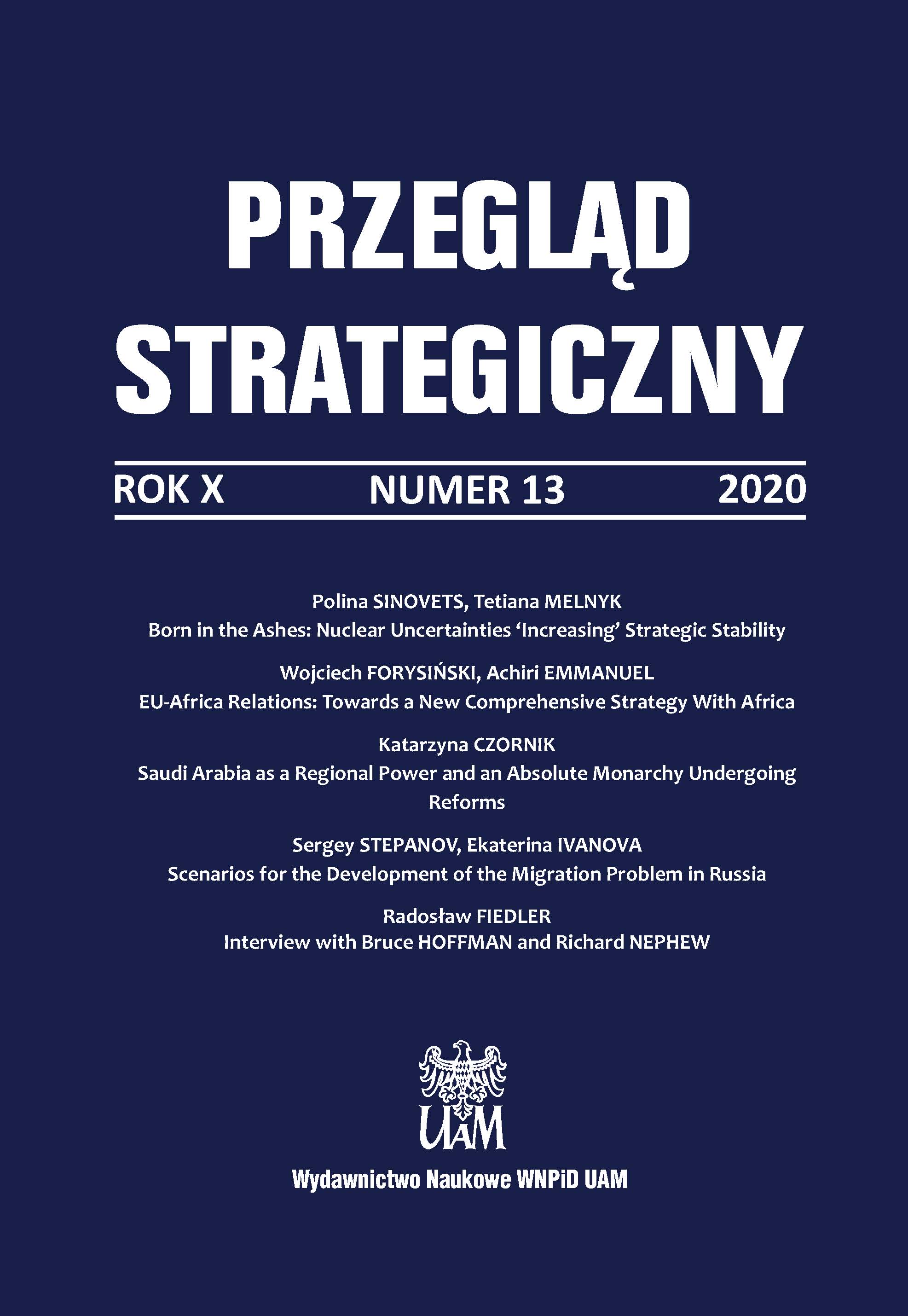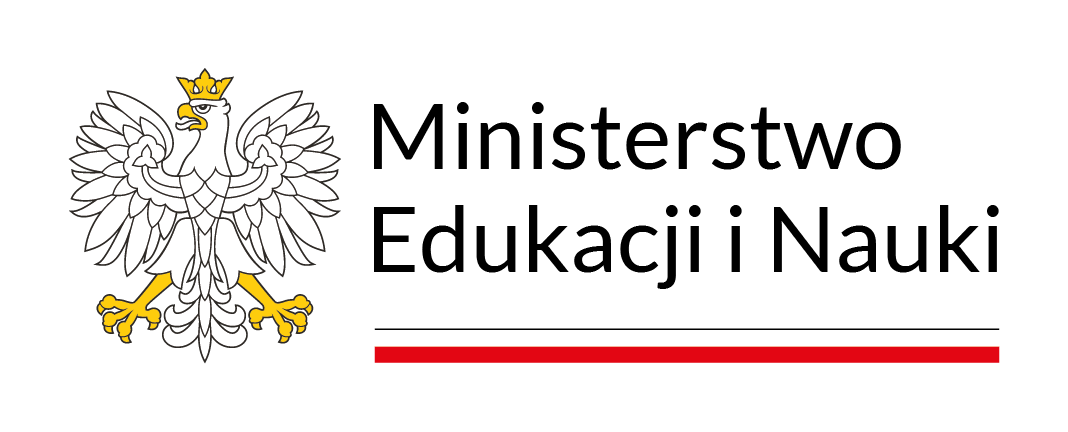Vol. 13/2020
FROM THE EDITOR
Sebastian Wojciechowski
“The Terrorist Bomb is Still Ticking” – Even in the Shadow of COVID-19
INTERNATIONAL SECURITY
Dmytro DUBOV, Anastasiia BAROVSKA, Iryna KORETSKA
“Active Measures” of the USSR Against the USA: Old Soviet Games
in the New Geopolitical Reality
Polina SINOVETS, Tetiana MELNYK
Born in the Ashes: Nuclear Uncertainties ‘Increasing’ Strategic Stability
Wojciech FORYSIŃSKI, Achiri EMMANUEL
EU-Africa Relations: Towards a New Comprehensive Strategy with Africa.
Between a Rock and a Hard Place
Nezir AKYEŞILMEN, Vanessa TINKER, Mohammed ISHMEAL
Turkey-US Relations in the Context of the Syrian Conflict: from Cooperation to Confrontation
Yevgeny RYABININ
Russia’s Exogenous Factor in the Donbass Conflict
Bogdan KOSZEL
The Role of Germany in the Transnistria Conflict
Mirza SABAWOON
The Role of the Polish Military Contingent in the Reconstruction of Ghazni Province
Paweł PASZAK
Inevitable War, US Decline or Business as Usual? Narratives on China’s
Ascension to Power among American Academia
REGIONAL ASPECTS OF SECURITY
Marianna GLADYSH, Oksana KRAYEVSKA, Oksana HOLOVKO-HAVRYSHEVA
Baltic-Black Sea Region as a Resilient Region: Political and Security
Aspects .
Katarzyna CZORNIK
Saudi Arabia as a Regional Power and an Absolute Monarchy Undergoing
Reforms. Vision 2030 – the Perspective of the End of the Second Decade
of the 21st Century
Wojciech GRABOWSKI
Political Regime Type and Regional Cooperation – a Case Study
of Arab States
Małgorzata PIETRASIAK
The ASEAN’s Attitude to the South China Sea Dispute after the Verdict
of the Permanent Court of Arbitration in The Hague
Grzegorz BALAWAJDER
The British-Irish Border in the Context of Brexit
Yuliia UZUN, Svetlana KOCH
Decentralization vs Centralization: Scenarios of Regional Development
of Ukraine in the Context of Internal Stability Establishment
DOMESTIC ASPECTS OF SECURITY
Sergii BONDARENKO, Tetyana NAGORNYAK, Mykola POLOVYI
Institutional Mechanisms to Ensure National Security in the Information Space of the United States, the United Kingdom and the Russian Federation
Sergey STEPANOV, Ekaterina IVANOVA
Scenarios for the Development of the Migration Problem in Russia
Mykola PRYMUSH, Hanna LAVRYNENKO
Political Identity as a Security Factor of Ukrainian Statehood
Nataliia STEBLYNA
Selling Insecurity via Twitter: Ukrainian President’s Posts and Modern
Political Discourse
Serhiy DANYLENKO, Yuliia NESTERIAK, Maryna GRYNCHUK
Ukrainian Historical Issues in Polish Media in the Context of a Hybrid War: Between Myths and Post-Truth
Artur WEJKSZNER
Boko Haram – the Evolution of Jihad Activity in Nigeria 2015–2019
HUMAN ASPECTS OF SECURITY
Włodzimierz FEHLER
Use and Application of Firearms by the Police in the Light of Human Rights
Standards in Poland
Robert MACIEJEWSKI
Right to Privacy and State Policy on Cyber Security. Necessity or Threat
from the State
Sergii PAKHOMENKO, Olga SARAJEVA
Securitization of Memory: a Theoretical Framework to Study
the Latvian Case
Maciej MAGIERA
Feminization of the Police from the Perspective of Comprehensive Risk
Minimization
ECONOMIC AND SOCIAL SECURITY
Olena BULATOVA, Mykola TROFYMENKO, Oleksandr KARPENKO,
Eduard FEDOROV
The External Component of National Economic Security
Oleg GRISHIN, Ralitsa TODOROVA, Aleksandr TOLOCHKO
Energy Security of the Black Sea Region: Geostrategy and Geoenergy
Measurement
Svitlana KHALATUR, Kateryna ZHYLENKO, Ihor VINICHENKO,
Olena TROKHYMETS, Lesia KRIUCHKO
The Formation of the International Imperatives of the National (Food)
Security Coefficient in Ukraine under Globalization
INTERVIEWS
Iran, Terrorism, and ISIS. Radosław Fiedler’s Interview with Bruce Hoffman
(Radosław Fiedler)
Sanctions, Accommodation, and Defiance. A Long Track of US Sanctions Targeted at Iran.
Radosław Fiedler’s Interview with Richard Nephe (Radosław Fiedler)
Articles published in “Przegląd Strategiczny” are distributed under the Creative Commons Attribution 4.0. License (CC BY 4.0). They may be copied, redistributed and shared only if appropriate credit is given.

